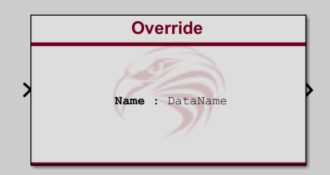Raptor:Override
Return to the main Raptor page

Description
The Raptor™ override block is used to be able to override the value on a wire from the calibration tool. The block will normally pass the value at the input port to the output port. However when the override state is set to Override the block will output the value input from the calibration tool.
Inputs
| Input | Type | Description |
|---|
Outputs
| Output | Type | Description |
|---|
Parameters
| Parameter | Type | Description |
|---|---|---|
| Name | String | This is the name of that will appear in the calibration tool. The name must be a valid C identifier. |
| Name Source | Chooses whether the name should come from the parameter or input wire name. | |
| Display As | Specifies how to display the value in the calibration tool. | |
| Gain | Number | This controls the scaling used to display the data in the cal tool.
display value = (Gain * actual value) + Offset |
| Offset | Number | This controls the scaling used to display the data in the cal tool.
display value = (Gain * actual value) + Offset |
| Max | Number | Sets the maximum value that can be set to any table data point in the calibration tool. |
| Min | Number | Sets the minimum value that can be set to any table data point in the calibration tool. |
| Format | Format String | Sets the display format to use in the calibration tool. |
| Enumeration Definition | Cell Array of strings or struct array | Provides the mapping of string representation to integer value for the enumeration. |
| Unit Text | String | Sets the unit text that is displayed in the calibration tool. |
| Help Text | String | Sets the help text that is displayed in the calibration tool. |
| Access Level | Sets the access level of this item in the calibration tool. | |
| Function | String | Sets the location where the variable appears in the calibration tool. Use raptor_xcp_function(gcb) to create a function based on the variables location in the model. |
Supported Versions
- Raptor 2013a_0.0.1 and newer